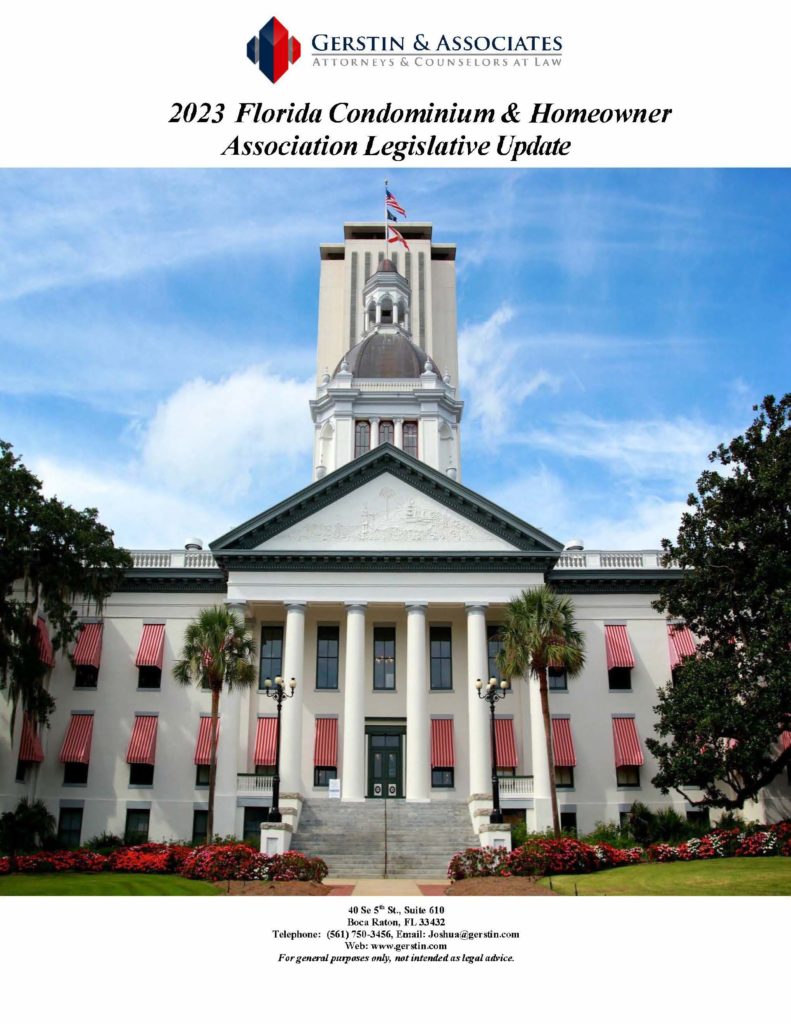Condominium Association
New Federal Law Mandates Community Association Disclosures!

By: Joshua Gerstin, Esq.
On January 1, 2024, a new Federal law known as the “Corporate Transparency Act” (“Act”) went into effect. The Act requires community association directors (and others) to disclose significant private personal information to the United States government by January 1, 2025.
Although the ACT was designed to pierce “shell” corporations in search of sex trafficking, money laundering, and other crimes, its overly and unnecessarily broad drafting ensnares community associations as not-for-profit corporations.
The ACT requires all corporations to report beneficial ownership information to the U.S. Treasury Department’s Financial Crimes Enforcement Network (FinCEN). Individuals who willfully fail to report the following information are subject to civil and criminal penalties:
• Association name.
• Board members’ names, birthdates, home addresses, and identifying information from a driver’s license, government-issued identification, or valid passport.
• Names, birthdates, home addresses, and identifying information from a driver’s license, government-issued identification, or valid passport of individuals with substantial control. Whether or not this requirement includes property managers is unknown.
Additionally, the federal government has to be notified within thirty days if any of the information already submitted changes (e.g., new directors or property managers). Currently, efforts are underway to exempt community associations from the ACT. However, considering this law was passed over a presidential veto and the inability of Congress to pass legislation, hopes are dim that the law will be changed before compliance is required. For more information or to prepare, below is the link to the website for submission of information for the ACT.
Beneficial Ownership Information Reporting | FinCEN.gov
Act Now!
Stay one step ahead of new legislation, recent case law, and new developments that may impact your community association by subscribing to the Gerstin & Associates newsletter.
Click Here to Subscribe to the Gerstin & Associates Newsletter
2023 Florida Community Association Legislative Update

On May 5, 2023, Florida’s Legislature concluded its annual 60-day legislative session. Unlike previous legislative sessions, this year’s session garnered little media attention while the legislators were busy at work passing many laws impacting Florida’s community associations.
For the .pdf version of this article, click here.
Following is a list of the bills Governor Ron DeSantis recently signed into legislation:
1. Homeowner Associations. House Bill 919 (“Homeowners Association Bill of Rights”) (click here for the full bill). These laws will take effect on October 1, 2023.
Board meeting notices. All Board meeting notices must specifically list the meeting’s agenda.
Owner deposits. If a homeowners association collects a deposit from a member for any reason, including for a tenant or construction, and regardless if it is called a “security deposit,” the association must maintain all funds separately and not commingle them with association funds. Additionally, all funds deposited with the association must be returned within thirty days after receiving notice the reason for which the deposit was collected is complete. If requested by the owner, the association must provide an accounting of the funds deposited within seven (7) days of receiving the request.
Kickbacks. If an officer or director (or property manager) solicits or receives anything of value for him or his family from any person or entity providing goods or services to the Association may be immediately removed from the Board by the remaining Board of Directors. The violator is also subject to civil monetary fines. However, an officer, director, or manager may continue to accept food consumed at a business meeting with a value of less than twenty-five dollars ($25.00) per person or a service or good receipt in connection with the trade fair or education program.
Official Records. The law clarifies any parcel owner, or their authorized representative, may inspect Official Records.
Fines. The existing law was clarified to make it clear that fines may be levied for violations of the declaration, bylaws, or rules. Additionally, the notice to the member from the fining committee must include a description of the alleged violation, the specific action required to cure such violation, if applicable, and the date and location of the hearing. A parcel owner can attend a hearing by telephone or other electronic means. The letter from the finning committee after its hearing must include any applicable fines or suspensions the committee approved or rejected and how the parcel owner or any occupant, licensee, or invitee of the parcel owner may cure the violation, if applicable. All payments for fines are due within five days from the notice to the member.
Voting. Each of the following acts is considered a fraudulent voting activity and constitutes a misdemeanor of the first degree:
- Willfully and falsely swearing to, or affirming at oath or affirmation, or willfully procuring another person to falsely swear to, or affirm an oath or affirmation in connection with or arising out of, voting activities.
- perpetrating, or attempting to perpetrate, or aiding in the perpetration of, fraud in connection with a vote cast, to be cast, or attempted to be cast.
- Preventing a member from voting or preventing a member from voting as he or she intended, by fraudulently changing or attempting to change a ballot, ballot envelope, vote, or voting certificate of the member.
- Menacing, threatening, or using bribery or any other corruption to attempt, directly or indirectly, to influence, deceive, or deter a member when the member is voting.
- Giving or promising directly or indirectly anything of value to another member with the intent to buy the vote of that member or another member or to corruptly influence that member or another member in casting his or her vote. However, this does not apply to any food served which is to be consumed at the election rally or meeting or to any item of nominal value which is used as an election advertisement, including a campaign message designed to be worn by a member.
- Using or threatening to use direct or indirect force, violence or intimidation or any tactic of coercion or intimidation to induce or compel a member to vote or refrain from voting in an election or on a particular ballot measure.
2. Homeowner Associations. House Bill 437 (click here for the full bill). These laws took effect on July 1, 2023:
Flags. If displayed respectfully, a homeowner may display up to two (2) of the following flags:
- The United States flag.
- The official flag of the State of Florida.
- U.S. Army, Navy, Air Force, Marine Corps, Space Force, or Coast Guard flag.
- POW-MIA flag.
- A first responder flag.
Storage & Display of Items. An association may not restrict parcel owners or their tenants from installing, displaying, or storing any items on a parcel that are not visible from the parcel’s frontage or an adjacent parcel, including, but not limited to, artificial turf, boats, flags, and recreational vehicles.
3. Condominiums. Surfside “glitch” bill, reserves, and inspections. This legislation has already taken effect:
On June 9, 2023, Governor DeSantis signed the “glitch” bill to purportedly fix some issues with the recent “Surfside” related inspection law. The full text of the law is available here, and a .pdf of this portion of the article is available here. Unless otherwise indicated, this legislation takes effect immediately. As with many legislative efforts, determining the effectiveness of the legislation and the discovery of unintended consequences takes time. At the very least, the changes to the Structural Integrity Reserve Study law (SB 154) listed below are a good start:
Reserve Funding:
- Multi-condominium associations operating at least 25 condominiums can use a line of credit as an alternate funding source for reserve funding.
- Reserve funding must be based on the association’s most recent Structural Integrity Reserve Study.
- The requirements to waive reserves or use reserves for an alternate purpose (allowable only until 2025) has changed to a majority of the total membership from a majority of those present at a meeting in which quorum was attained.
- Inflation can be considered by an association when determining reserve funding.
- Depending on specific requirements, a 40 or 50-year certification may be used instead of the visual survey portion of a SIRS.
- The unduly harsh strict liability standard to find a director liable for a breach of fiduciary duty for not complying with the new reserve requirements has been changed. The new standard is now the more reasonable “willful and knowing.”
- Reserves are only required for components an association is responsible for according to its Declaration. Reserves are not needed for items whose useful life exceeds 25 years. However, deferred maintenance reserves for these items are still required.
- Along with architects and engineers, a reserve specialist can now perform the visual inspection portion of a SIRS.
- Exterior doors are now reserve components, and the floor and foundation are not unless the floor and foundation are part of the building’s “structure,” which, of course, they are.
Inspections:
- Insurance premiums are excluded from the 115% calculation that allows members to challenge a budget.
- The Florida Building Code is designated as authoritative to determine the height of a building.
- An association has a year or less (depending on local ordinances) to repair damage identified in an inspection.
- Fourteen days’ notice to members is required upon an association’s receipt from a local governing authority a milestone inspection is required. The notice must also include the date the milestone inspection must be completed.
- An architect and an engineer acting as a licensed design professional may conduct a milestone inspection.
- The definition of “substantial structural deterioration” was broadened to include “substantial structural weakness.”
- A local governing authority has the discretion to extend an inspection deadline for “good cause,” which at the least requires the association to have entered into a contract for a milestone inspection that cannot be completed by the deadline.
- No more than 45 days after receiving the inspection report from the architect or engineer, the association must post a summary on its website, mail it to the members, and make the summary or report available to renters.
- Community association managers no longer have to comply with the structural inspection laws solely because they manage a property “that has a building” on it.
- Local authorities can set a 25-year inspection requirement based on environmental conditions, such as proximity to a shoreline.
- Condominium units in which personal property is covered under a flood master policy or located above specific floors may not be required to have flood insurance.
- As of July 1, 2027, mediation is available to members for certain structural and life-safety disputes.
- Developers must provide prospective buyers with statements regarding milestone inspections, SIRS, and reserve studies, if applicable. The law introduces additional presale notice requirements in contracts to ensure buyer awareness.
4. Condominiums. Safety, Security and Crime Prevention. House Bill (HB) 837 overhauls Florida’s litigation landscape. The law is already in effect and is expected to reduce frivolous liability claims against residential associations (click here for full bill text):
When implemented by an association, the following safeguards exempt an association from liability if a third party commits a crime on their property:
- Security cameras at points of entry and exit that keep video retrievable for 30 days.
- Lighted parking available from dusk to dawn.
- Lighting in common areas, porches, walkways, and laundry rooms from dusk to dawn.
- Deadbolts measuring at least one inch on every door of every unit.
- Locking devices on every window and sliding door not used for community purposes.
- Locked gates at pool areas with fob or key access.
- Peepholes or viewers on doors that do not have windows or window next to doors
- By January 1, 2025, associations must have a Crime Prevention Through Environmental Design (CPTED) study performed by a law enforcement agency or a Florida Crime Prevention Through Environmental Design Practitioner (FCP). CPTED studies should be no older than 3 years old, and the association must substantially comply with the assessment.
- Associations must also provide their employees with safety and crime prevention training by January 1, 2025. This training must familiarize employees with security principles, devices, measures, and standards. After January 1, 2025, associations must train new employees within 60 days. The Florida Crime Prevention Training Institute of the Department of Legal Affairs will develop a proposed curriculum or best practices to implement the training.
Act Now!
Stay one step ahead of new legislation, recent case law, and new developments that may impact your community association by subscribing to the Gerstin & Associates newsletter.
Click Here to Subscribe to the Gerstin & Associates Newsletter
SB 154 Glitch Bill to the Rescue!

On June 9, 2023, Governor DeSantis signed the “glitch” bill to purportedly fix some issues with the recent “Surfside” related inspection law. The full text of the law is available here, and a .pdf of this article is available here. Unless otherwise indicated, this legislation takes effect immediately.
As with many legislative efforts, determining the effectiveness of the legislation and the discovery of unintended consequences takes time. At the very least, the changes to the Structural Integrity Reserve Study law (SB 154) listed below are a good start:
Reserve Funding:
- Multi-condominium associations operating at least 25 condominiums can use a line of credit as an alternate funding source for reserve funding.
- Reserve funding must be based on the association’s most recent Structural Integrity Reserve Study.
- The requirements to waive reserves or use reserves for an alternate purpose (allowable only until 2025) has changed to a majority of the total membership from a majority of those present at a meeting in which quorum was attained.
- Inflation can be considered by an association when determining reserve funding.
- Depending on specific requirements, a 40 or 50-year certification may be used instead of the visual survey portion of a SIRS.
- The unduly harsh strict liability standard to find a director liable for a breach of fiduciary duty for not complying with the new reserve requirements has been changed. The new standard is now the more reasonable “willful and knowing.”
- Reserves are only required for components an association is responsible for according to its Declaration. Reserves are not needed for items whose useful life exceeds 25 years. However, deferred maintenance reserves for these items are still required.
- Along with architects and engineers, a reserve specialist can now perform the visual inspection portion of a SIRS.
- Exterior doors are now reserve components, and the floor and foundation are not unless the floor and foundation are part of the building’s “structure,” which, of course, they are.
Inspections:
- Insurance premiums are excluded from the 115% calculation that allows members to challenge a budget.
- The Florida Building Code is designated as authoritative to determine the height of a building.
- An association has a year or less (depending on local ordinances) to repair damage identified in an inspection.
- Fourteen days’ notice to members is required upon an association’s receipt from a local governing authority, a milestone inspection is required. The notice must also include the date the milestone inspection must be completed.
- An architect and an engineer acting as a licensed design professional may conduct a milestone inspection.
- The definition of “substantial structural deterioration” was broadened to include “substantial structural weakness.”
- A local governing authority has the discretion to extend an inspection deadline for “good cause,” which at the least requires the association to have entered into a contract for a milestone inspection that cannot be completed by the deadline.
- No more than 45 days after receiving the inspection report from the architect or engineer, the association must post a summary on its website, mail it to the members, and make the summary or report available to renters.
- Community association managers no longer have to comply with the structural inspection laws solely because they manage a property “that has a building” on it.
- Local authorities can set a 25-year inspection requirement based on environmental conditions, such as proximity to a shoreline.
- Condominium units in which personal property is covered under a flood master policy or located above specific floors may not be required to have flood insurance.
- As of July 1, 2027, mediation is available to members for certain structural and life-safety disputes.
- Developers must provide prospective buyers with statements regarding milestone inspections, SIRS, and reserve studies, if applicable. The law introduces additional presale notice requirements in contracts to ensure buyer awareness.
Act Now!
Stay one step ahead of new legislation, recent case law, and new developments that may impact your community association by subscribing to the Gerstin & Associates newsletter.
Click Here to Subscribe to the Gerstin & Associates Newsletter
Fannie Mae’s Secret Blacklist of South Florida Condominium Associations.

In the wake of Surfside, some South Florida’s condominium associations cannot find lenders willing to lend for capital projects or to potential buyers. It’s doubtful South Florida’s condominium associations that restored, rehabilitated, and stabilized their operation can ever leave the list.
For more information:
Fannie Mae, Freddie Mac Keep Secret “Blacklist” of Properties (therealdeal.com)
Florida Condominium Living is About to Become Very Expensive.

–By Joshua Gerstin, Esq.
If you own a condominium in Florida, it is important to be aware of the significant cost increases condominium owners will face due to recent changes in Florida law and ever-increasing insurance premiums. In particular, the new Structural Integrity Law, with its mandated increases in reserve requirements and the skyrocketing cost of insurance, will cause many Florida condominium owners to sell their units and many condominium associations to pursue termination of their condominium associations.
The Structural Integrity Law was passed in response to the collapse of the Champlain Towers South condominium building in Surfside, Florida, in June 2021. The law requires all condominium associations in Florida to complete a structural inspection by a qualified engineer or architect and a reserve study by the end of 2021. Condominium associations are required to make any necessary repairs identified in the inspection.
The cost of the required inspections, reserve study and repairs can be significant. According to estimates from the Community Associations Institute, the cost of a structural inspection alone can range from $10,000 to $50,000 or more, depending on the size and complexity of the building. Repairs identified in the inspection can cost millions of dollars, and may require assessments or increases in monthly assessments to cover the costs.
In addition to the costs associated with the Structural Integrity Law, Florida condominium owners will also face increases in reserve requirements. The Structural integrity law prohibits the pooling of reserves for certain designated items or items identified as in need of repair by the structural inspection. Additionally, the law also removed the ability of condominium associations to partially fund or waive full funding of reserves.
The increase in reserve requirements will likely result in higher monthly assessments for condominium owners in associations that routinely chose not to fully fund their reserves. Condominium associations may need to levy special assessments to make up for any shortfall in reserve funds. These assessments can be a significant burden on condominium owners, particularly those who are already struggling financially.
Finally, condominium owners in Florida can expect to see exponential increases in their insurance premiums. Insurance companies are raising rates for condominium associations in response to the Champlain Towers South collapse and the resulting scrutiny of building safety and maintenance practices.
The new Structural Integrity Law, along with increases in reserve requirements and insurance premiums, will have a significant impact on the costs of owning a condominium in Florida. Condominium associations have options to mitigate these issues, but they have to act fast by taking steps NOW to ensure their condominium associations remain financially stable with a safe and secure living environment for their residents.
Act Now!
Stay one step ahead of new legislation, recent case law, and new developments that impact your community association by subscribing to the Gerstin & Associates newsletter.
Click Here to Subscribe to the Gerstin & Associates Newsletter
60 Minutes Segment on the Surfside Collapse.
Florida Condominium Safety Bill.
Pass or Fail?
Act Now to Prepare your Condominium Association for the New Condominium Safety Bill.
By Joshua Gerstin, Esq.
Click here for .PDF of this article
Click here for full text of Condo. Safety Bill.
After failing to pass a condominium safety bill after the Surfside tragedy during the regular legislative session, Florida’s legislators agreed to a special legislative session. Surprisingly, Florida’s House and Senate agreed upon a compromise version of the bill in an extended legislative session. Governor DeSantis signed the bill into law on May 26, 2002.
Although the bill takes effect immediately, its major provisions do not begin to take effect until 2024. While 2024 might seem far into the future, the changes caused by this bill will require all condominiums to begin preparing now.
Following are some highlights of the new condo-safety bill (a copy of the bill can be found here):
- Boards will be prohibited from waiving reserve requirements for structural repairs or from using money in those reserves for other purposes.
- Structural safety inspections would be required for buildings three stories or higher by the
year the building turns 30 and every 10 years afterward. - For buildings constructed before July 1, 1992, the first structural inspection must be performed before Dec. 31, 2024.
- Buildings within three miles of the coast must be inspected before the building reaches age 25 and every 10 years afterward.
- A report of the inspection’s findings must identify any substantial structural deterioration, whether the deterioration is dangerous or unsafe, and whether remedial or preventive repairs are recommended.
- Condo associations or governing boards must distribute copies of the report to all unit owners.
- County governments may require commencement of repairs within specified timeframes if a report identifies substantial structural deterioration.
- Every 10 years, condominium boards must produce studies of the reserve funds required for future repairs of structural integrity components.
- When a unit is sold, buyers must be told about the history of the condominium association, the reserve requirement, and the present status of the reserve fund.
- Developers of new buildings will have to fund reserves before transferring control to condominium boards.
- All structural inspection reports and reserve studies are to be part of the associations’ Official Records and must be provided to potential purchasers of a unit.
- It is a breach of an officer or director’s fiduciary duty if the Association fails to complete a Structural Integrity Reserve Study, as necessary.
There are more than 1.5 million condominium units in Florida operated by nearly 28,000
associations, according to a legislative analysis conducted earlier this year, Of those, more than 912,000 are older than 30 years and are the home to more than 2 million residents. However, there are currently only 650 inspectors certified to perform the required inspections. The state’s Division of Florida Condominiums, Timeshares, and Mobile Homes will enforce the bill’s new requirements.
Act Now!
Stay one step ahead of new legislation, recent case law, and new developments that impact your community association by subscribing to the Gerstin & Associates newsletter.
Click Here to Subscribe to the Gerstin & Associates Newsletter
Are the million-dollar PPP loans many PBC golf communities collected justified?
In the News:
Six golf country clubs in Palm Beach County – Hunters Run, Quail Ridge, Wycliffe, Old Palm, Banyan Cay and the Loxahatchee Club – may have received as much as $18 million in PPP loans through the Small Business Administration.
Six golf course communities are among the more than 3,000 businesses in Palm Beach County that received Payroll Protection Program (PPP) loans through the Small Business Administration (SBA).
An analysis of the loans released this week by the SBA shows that the six clubs may have received as much as $18 million. The SBA had been sued by a number of newspaper organizations over the identity of the loan recipients. When the applicants applied, they were told the loans would be public record.
The program was designed to keep employees on the payroll. If employers do that and comply with the loan conditions, the loans become grants and do not have to be repaid.
The SBA agreed to identify all recipients of loans in excess of $150,000 but only provided ranges of funds received, refusing to reveal the exact amount.
The data released by the SBA do not include the amount of the loan but rather the loan amount a bank has approved. The actual amount of a loan could be smaller than the approved amount. All amounts are in ranges.
Some golf course communities that accepted PPP loans in Palm Beach County have recently spent upward of $10 million on massive improvements to their clubhouses and golf courses.
The clubs that took the money include:
– Hunters Run ($2 million to $5 million) in Boynton Beach.
– Quail Ridge ($1 million to $2 million) in Boynton Beach.
– Wycliffe ($2 million to $2.5 million) in Wellington.
– Old Palm ($1 million to $2 million) in Palm Beach Gardens.
– Banyan Cay Resort Club ($700,000 to $2 million) in West Palm Beach.
– The Loxahatchee Club Homeowners Association ($150,000 to $300,000) in Jupiter.
Scores of other Palm Beach country clubs had applied for the PPP loans. Many were approved but decided to refuse to accept the money on both moral grounds and legal grounds after reading the fine print. Government auditors are expected to review how the money was spent and can ask for the money to be returned and penalties to be imposed if they find misrepresentations.
Fifty-seven country clubs in Florida accepted the PPP funds. According to CNBC, more than 400 country clubs and golf courses received loans throughout the country. The issue of whether it is appropriate for golf course communities to receive PPP loans has been debated.
Assessment revenue a factor
Joshua Gerstin, a Boca Raton lawyer who specializes in homeowner and condominium association law, said he expects one factor the SBA will consider is how much revenue a country club gets from its assessments.
“If it is mostly assessment driven, the country club might have a problem,” he said. “If members continued to pay their assessments, there was no real loss of revenue. But if much of it comes from dining and other sources that members pay outside of their assessments, they could be eligible.”
According to the SBA, businesses must certify that the loan is needed “to support ongoing” operations and that they are unable to access “other sources of liquidity” to support their ongoing operations.
Addison Reserve General Manager Michael McCarthy said once he and his board saw those revised requirements, they decided that it would be wrong to participate in the PPP program.
“There was no way I could certify that we needed it stay in business or that we didn’t have other sources of liquidity,” he noted.
Wycliffe, Quail Ridge: We preserved jobs
Hunters Run President Michael Soroka declined to comment on the issue. According to the SBA, Hunters Run and Banyan failed to provide data to indicate how many jobs were saved by the loans. Wycliffe was chastised on CNBC early Tuesday morning for accepting its loan. The Post has learned that the Wycliffe loan amount was $2 million. It was able to preserve 281 jobs. Wycliffe’s general manager, Rob Martin, released a statement to The Post that read:
“At Wycliffe, we are thankful to all of our employees for their hard work and dedication through these challenging times. We took PPP money because we care deeply about our team and wanted to make sure that we had the ability to provide them a regular paycheck. Following the legal parameters, we only requested and received enough to cover our payroll needs and did not use our loan in any way to disadvantage other companies. We are thankful that we qualified to receive money so that our employees and their families could make ends meet during these challenging times.”
Quail Ridge GM William Langley said the PPP loan was used as intended. He noted that Quail Ridge would have had to have laid off many of its 300 employees without the loan. “We are not a club with deep pockets,” he said.
The Club at Admiral’s Cove in Jupiter was one of those that returned the funds – $3.1 million. “We saw too many issues, both moral and legal,” said CEO Bret Morris. “We did not want to take the risks.” He said Admiral Cove was able to keep its 500 employees working, noting: “We found other things for them to do.”
Finally! Florida Passes Emotional Support Animal Law.
Finally, the Florida legislature passedSB1084 a bill regulating the out of control problem of Emotional Support Animals in Florida’s community associations. SB 1084 was signed into law by Governor DeSantis on July 1, 2020, and takes effect immediately. The new law provides for the following (a copy of SB 1084 can be found here)(a copy of this page in .pdf can be found here)
1. Amends Florida’s Fair Housing Act by prohibiting a housing provider, to the extent required by federal law, rule, or regulation, to deny housing to a person with a disability or a disability-related need who has an animal that is required as support. It defines emotional support
animal as an animal that is not required to be trained to assist a person with a disability but, by virtue of its presence, provides support to alleviate one or more identified symptoms or effects of a person’s disability.
2. The bill prohibits a housing provider from charging a person with an emotional support animal additional fees. It does allow a housing provider to prohibit the animal if it poses a direct threat to the safety, health, or property of others and to request written documentation that reasonably supports that the person has a disability. The supporting information may be provided by any federal, state, or local government agency, specified health care practitioners, telehealth providers, or out-of-state practitioners who have provided in-person care or services to the tenant on at least one occasion. If a person requests to keep more than one emotional support animal, the housing provider may request information regarding the specific need for each animal and may require proof of licensing and vaccination requirements for each animal.
3. The bill prohibits a housing provider to request information that discloses the diagnosis or severity of a person’s disability or any medical records relating to the disability. The housing provider is authorized to develop a routine process for reasonable accommodation requests relating to emotional support animals, but prohibits the denial of a request based only on a tenant’s failure to use a specific form or process.
4. The bill creates a new cause for disciplinary action against a health care practitioner’s license for providing supporting information for an emotional support animal, without personal knowledge of the patient’s disability or disability-related need. It also creates the misdemeanor crime of providing false or fraudulent emotional support animal information or documentation, and requires a convicted person to perform 30 hours of community service for an organization serving persons with disabilities, or another entity or organization the court determines
appropriate.
Stay Informed!
Click Here to Subscribe to the Gerstin & Associates Newsletter

